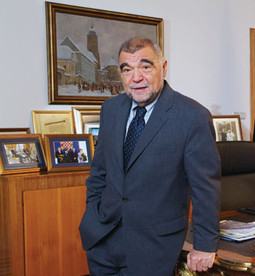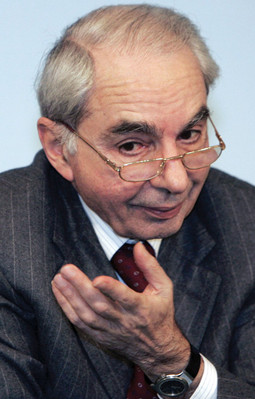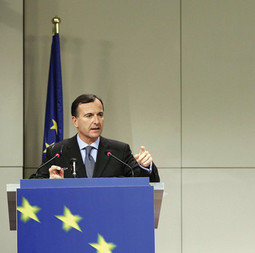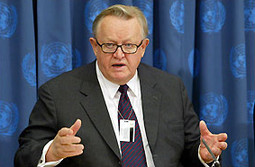Published in Nacional number 588, 2007-02-20
EXCLUSIVE INTERVIEW
'I reacted as I had to react'
PRESIDENT STJEPAN MESIC speaks exclusively for Nacional about his reaction to the statement by the Italian president, Croatian-Italian relations and other foreign policy issues
 President of Croatia Stjepan Mesić President Stjepan Mesic has found himself in recent days in the spotlight of both the Croatian and Italian public following his reaction to a statement by Italian President Giorgio Napolitano. On 10 February, the Italian President accused the “bloodthirsty Slavic hatred” for the crimes against Italians following World War II. President Mesic reacted sharply to Napolitano’s statement. This was followed by a reaction from the European Commission, calling Mesic’s reaction unfounded and inappropriate. Soon afterwards, the Croatian government stood on the side of Mesic. The entire situation threatened to result in an escalation of Croatian-Italian relations, however, a joint reconciliatory statement was issued by the offices of Napolitano and Mesic on Saturday evening.
President of Croatia Stjepan Mesić President Stjepan Mesic has found himself in recent days in the spotlight of both the Croatian and Italian public following his reaction to a statement by Italian President Giorgio Napolitano. On 10 February, the Italian President accused the “bloodthirsty Slavic hatred” for the crimes against Italians following World War II. President Mesic reacted sharply to Napolitano’s statement. This was followed by a reaction from the European Commission, calling Mesic’s reaction unfounded and inappropriate. Soon afterwards, the Croatian government stood on the side of Mesic. The entire situation threatened to result in an escalation of Croatian-Italian relations, however, a joint reconciliatory statement was issued by the offices of Napolitano and Mesic on Saturday evening.
President Mesic commented for Nacional on the entire crisis, as well as a series of other foreign policy issues, such as the indemnification for the Italian Esuli, his planned meeting with Slovenian President Janez Drnovsek, the Ahtisaari plan for Kosovo and threats by Milorad Dodik to hold a referendum on the independence of Republika Srpska.
NACIONAL: How did it come to the release of your statement and the statement of Italian President Napolitano, which broke off the polemics started by Napolitano’s statement?
- Our two sides were in constant communication via our Ambassador in Rome, Tomislav Vidosevic and our statements are the result of that communication, but also first and foremost the expression of a sincere desire by both Zagreb and Rome to reaffirm our relations and to strengthen the only foundations those relations can rest on today and built on tomorrow.
NACIONAL: What message can the Croatian side extract from the recent events in Croatian-Italian relations?
- I don’t think we need to extract any message. Something happened, something that we assessed to be unacceptable and threatening to our relations with Italy. As President, I reacted in the only way I could and then we discussed the matter openly. We received a certain explanation from the Italian side and based on that, we reached a solution that was acceptable for both sides. But if you insist on a message, then I would say that we could learn how to conduct ourselves when our national interests are at stake.
NACIONAL: Will these events have any positive impacts on Croatian-Italian relations?
- I think it can have only positive impacts. We showed, on both sides, the ability to converse even under conditions of serious disagreement and, furthermore, we demonstrated our desire and ability to overcome misunderstandings and not to question what is most important: the principles upon which our bilateral relations and bilateral treaties governing those relations are based on.
NACIONAL: The Italian press claims that you gave in, that you took a “step backwards”.
- Both we and the Italians made a certain step forward by eliminating those issues threatening our relations. I would invite everyone to take a look at the published documents or statements to conclude the position of either side. It is not good to talk about the “winners” and the “losers”. Besides, there is only one winner, and that is common sense.
NACIONAL: Is there a set arrangement as to your upcoming visit with the Italian President, as announced by the Croatian media?
- Currently, there is no such arrangement, but now it is clear that there is a mutual interest for such a meeting, and that is a good thing.
NACIONAL: How do you comment on the statement by the spokesperson of the European Commission who criticised your statement about President Napolitano had said?
- The person you mention and who in the meantime has been criticised by both Premier Sanader and Foreign Minister Grabar-Kitarovic, obviously had neither good nor complete information. Therefore, I can only repeat why my Office immediately passed on to Ambassador Degert, Head of the European Commission in Croatia: the statement by the European Commission’s spokesperson was biased and improper.
NACIONAL: Based on the reactions and criticisms of the Italian politicians, did you perhaps feel that you had been to rash in your assessment?
- Absolutely not. My assessment was well thought out and founded. And the Italian politicians were only doing what some in Croatia took longer to do: standing behind their president.
NACIONAL: How do you comment on the proposal by Croatian MP for the Italian minority Furio Radin on the need for an emergency meeting of the Croatian, Italian and Slovenian presidents in order to discuss the issues of the past?
- One of the primary presidential tasks is to discuss the problems of the present and the future, and not use the past to serve everyday political goals. My position on a three-sided meeting is well known. It’s a good idea, but an idea that requires a great deal of preparation in order to achieve it. Such a meeting would have to be based on a readiness to face the whole truth about the past, and not just selective recognition or covering up the past. I think that at this time it is necessary to realise a Croatian-Italian summit, and only then can we think about making it three-sided.
 Italian Minister of Interior Giuliano Amato NACIONAL: Italian Interior Minister Giuliano Amato refuted claims that Italy plans to launch a revision of the Osim Agreement and other demarcation treaties. Can this be considered a definite guarantee by the Italian side that this issue will not be opened?
Italian Minister of Interior Giuliano Amato NACIONAL: Italian Interior Minister Giuliano Amato refuted claims that Italy plans to launch a revision of the Osim Agreement and other demarcation treaties. Can this be considered a definite guarantee by the Italian side that this issue will not be opened?- This has not been said only by Minister Amato in recent days. These kinds of statements please me. Not so long ago, we heard other announcements, either direct or stifled, which caused our concern. The Osim and Rome Agreements and, within that the Paris Peace Agreement with Italy, form the foundation of Croatian-Italian relations, and this is a foundation that cannot and must not be touched. I know that there are some on the Italian side that do not agree, but it is important that these are not among the government, regardless of which party is in power. The sincere desire of the Italian side to build solid relations with Croatia is the best guarantee that Italy will not open issues that were definitively resolved long ago.
NACIONAL: What did you mean when you said that the Italian Esuli deserve compensation?
- With regards to the optants, those who opted to live in Italy and not in Yugoslavia, that issue was fully resolved by the Osim Agreement. We still need to pay about thirty million dollars to Italy on behalf of their compensation. For years, Croatia has been informing Italy that it is prepared to carry out that obligation, but for reasons known only to Italy, they have desired to leave this issue open and have never given us the account number to make the payment.
 President of The European Comission Franco FrattiniNACIONAL: Vice-President of the European Commission Franco Frattini criticised you for giving such a statement, being a president of a state leaning towards EU membership, implying that this could hinder Croatia’s entry into the EU. How do you comment on that statement?
President of The European Comission Franco FrattiniNACIONAL: Vice-President of the European Commission Franco Frattini criticised you for giving such a statement, being a president of a state leaning towards EU membership, implying that this could hinder Croatia’s entry into the EU. How do you comment on that statement?- Mr. Frattini obviously did not understand what I was saying and his statement is unfounded. Never did I say or do anything that could hinder Croatia on its path towards the EU, nor will I. But I will continue to fight for the truth and for Croatia’s national interests.
NACIONAL: Did Croatian politics react on time and offer you its support? It took Premier Sanader several days to speak up, raising speculations in Italy that you do not have support from the government.
- I had and have the support of the citizens, and that support is very impressive. One daily newspaper conducted a poll, and according to that poll, I had the support of 81% of citizens. Not to mention the letters of support I receive every day at my Office. The Government reacted the way it did and when it did. These are facts that are well known and need no special comment from me.
NACIONAL: When will your meeting with Slovenian President Janez Drnovsek, cancelled at the last minute, be held?
- I have to correct you. That meeting was not cancelled but postponed for technical reasons. My friend Drnovsek and I want to meet and I am sure that we will do so in the near future, of course, depending on our other obligations.
NACIONAL: How do you comment on the obvious intent of the European Union to forgive Serbia its obligation to extradite General Ratko Mladic to the ICTY prior to continuing negotiations on signing the Stabilisation and Association Agreement due to the Kosovo issue?
- I think that is a premature conclusion and there is no point in answering a question based on assumptions. Croatia will certainly following the events in Serbia very closely and will support those forces in Serbia that are democratically inclined and pro-European. We expect the European Union not to have double standards, as that would only undermine its credibility.
NACIONAL: Why did you decide to testify for the defence at the upcoming ICTY trial of the Croatian generals?
- I will repeat something I have already said many times. A witness in court does not give its statement to benefit the defence or the prosecution. The witness gives a testimony of the facts, those facts known to him and as they are known to him. That is how I conducted myself every time I was called before any court, and how I will conduct myself in the future. And, with respect to the ICTY, if summoned, it is my duty as a Croatian citizens to give my testimony.
NACIONAL: How do you assess the unfolding of events in BiH in light of the announcement by the premier of Republika Srpska on a possible independence referendum of that entity if the international community forces new reforms to strengthen the central organs of Bosnia and Herzegovina?
- It is certainly not good to wave about the threat of a referendum that has no legal or political basis. This is not good for either Republika Srpska or Bosnia and Herzegovina. I plan to discuss the situation in the neighbouring state with all three members of the BiH presidency who are coming on an official visit to Croatia in early March. Our interest is a peaceful and stable Bosnia and Herzegovina with which we can maintain and develop good neighbourly and mutually beneficial relations.
 Martti AhtisaariNACIONAL: How do you assess the Ahtisaari plan for Kosovo?
Martti AhtisaariNACIONAL: How do you assess the Ahtisaari plan for Kosovo?
- That plan is not yet known in full detail, while talks are still ongoing. It would not be political wise to comment on it at this stage. I can only say that the Republic of Croatia supports the process of establishing the final status of Kosovo, and we hope that such a status will be confirmed in such a manner as to satisfy both sides or, if nothing else, that both sides will be equally dissatisfied. The most dangerous solution is when one side considers itself the victor and the other defeated. Of course, there can be no turning back.
Latest news
-
28.10.2010. / 14:15
'A profitable INA is in everyone's interest'
-
28.10.2010. / 09:38
Sanader’s eight fear SDP — Won’t bring down Government
-
21.10.2010. / 15:02
Interior Ministry turned a blind eye on Pukanic assassination
-
20.10.2010. / 09:34
Barisic could bankrupt HDZ



